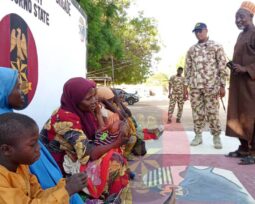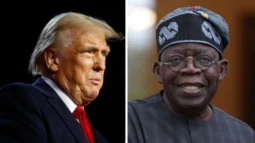As Nigeria prepared for the 2003 general elections, the People’s Democratic Party—once celebrated as Africa’s largest political movement—set its sights on eliminating every form of opposition. But in the shadows of their political manoeuvring, a different path was quietly being paved—one that would ultimately lead Bola Ahmed Tinubu to the nation’s highest office.
In 2003, the PDP, under President Olusegun Obasanjo, had tasked then-Vice President Atiku Abubakar with reclaiming the South-West for the ruling party. Their mission: unseat all six governors elected under the Alliance for Democracy. It was a calculated move to consolidate power.
But one man refused to fall in line.
Bola Tinubu, then Governor of Lagos State, saw through the scheme and warned his fellow South-West governors. While others ignored the signs, Tinubu stood his ground—and launched his re-election campaign alone.
What followed was one of the most ruthless governorship elections in Nigerian history. By the time the dust settled, five AD governors were swept away by the PDP tsunami. Only Bola Tinubu remained—earning him the nickname that echoed across Nigeria: The Last Man Standing.
Re-elected for a second term in May 2003, Tinubu wasted no time. He assembled a loyal team and appointed a relatively unknown figure as Chief of Staff—Babatunde Raji Fashola. Together, they laid the foundation of a political structure that would shake the nation two decades later.
But the fight was far from over.
In retaliation for his defiance, the federal government seized Lagos State’s monthly allocation. Tinubu, knowing the battle couldn’t be won by politics alone, turned to the law—and entrusted the legal fight to his Attorney General, Yemi Osinbajo. What began in the Federal High Court would stretch to the Supreme Court, and eventually, end in Tinubu’s favor.
By 2004, sensing that his party—the Alliance for Democracy—had been infiltrated by federal influences, Tinubu made a bold move. He formed a new political vehicle: The Action Congress of Nigeria.
And in a controversial but calculated decision, he backed his Chief of Staff, Babatunde Fashola, to succeed him as Lagos governor in 2007—bypassing more seasoned political heavyweights.
The PDP, sensing the threat, countered with Musiliu Obanikoro—a grassroots politician and former Tinubu ally. With Abuja’s backing and billions of naira in play, the stage was set for an epic political showdown.
Tinubu, who had planned to run for the Senate, shelved his ambition and handed the ticket to his loyalist, Ganiyu Solomon. He returned to the trenches—leading a relentless, street-by-street, one-man-one-vote campaign.
In what would become one of the fiercest electoral battles in Lagos history, the young Action Congress of Nigeria emerged victorious. Fashola won. Tinubu won. And across Nigeria, a new political force was awakening.
On the night of that victory, crowds swarmed Tinubu’s Lagos Island residence in celebration. It wasn’t just a win for Lagos—it was the birth of a political movement that would march steadily toward the heart of Abuja.
Two decades later, Bola Ahmed Tinubu would rise from The Last Man Standing to The Man at the Helm.
A journey that began with resistance… ended in the Presidency.







